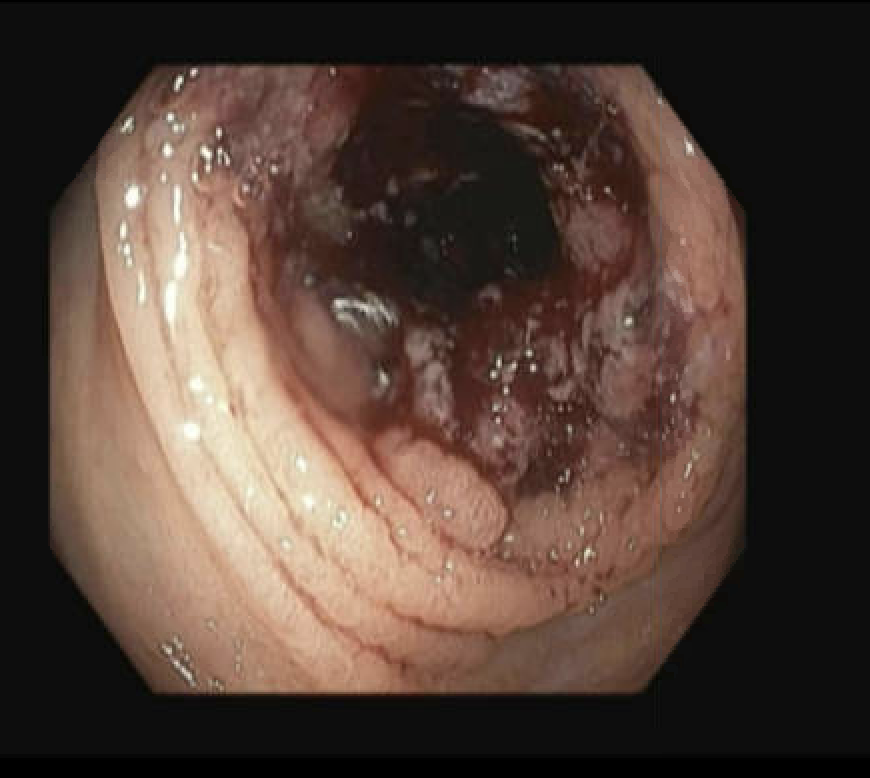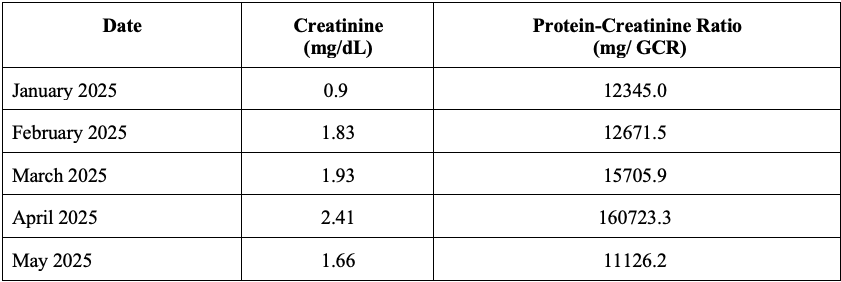Monday Poster Session
Category: Colorectal Cancer Prevention
P2675 - Membranous Nephropathy as a Paraneoplastic Manifestation Unveiling Occult Stage IIB Colorectal Adenocarcinoma: A Case Report
Monday, October 27, 2025
10:30 AM - 4:00 PM PDT
Location: Exhibit Hall

Rumit Mistry, DO (he/him/his)
Florida State University College of Medicine/ Sarasota Memorial Hospital, FL
Presenting Author(s)
Rumit Mistry, DO1, Matthew Miller, DO1, Karen Hamad, MD1, Shivani Patel, MD2
1Florida State University College of Medicine/ Sarasota Memorial Hospital, Sarasota, FL; 2Florida State University College of Medicine / Sarasota Memorial Hospital, Sarasota, FL
Introduction: Membranous nephropathy (MN) is a leading cause of nephrotic syndrome, with infrequent yet significant associations reported with solid malignancies such as lung and prostate cancer. The imperative to investigate underlying etiologies, including occult malignancy, is paramount due to the substantial risks of progression to end-stage renal disease and metastatic dissemination. This report details a compelling case where the insidious onset of MN served as the initial clinical manifestation, ultimately leading to the diagnosis of an advanced-stage colorectal adenocarcinoma.
Case Description/
Methods: In December 2024, a 75-year-old female presented with bilateral lower extremity edema and nephrotic-range proteinuria, quantified by a protein-to-creatinine ratio of 12345 mg/G CR. A subsequent renal biopsy conclusively established the diagnosis of membranous nephropathy. Initial therapeutic intervention with steroids proved ineffective, necessitating the initiation of rituximab. Five months later, in May 2025, an evaluation for symptomatic anemia led to a colonoscopy, which revealed a suspicious mass located at the hepatic flexure. Histopathological examination confirmed the presence of invasive colorectal adenocarcinoma. A robotic right hemicolectomy was performed, and the definitive pathology report revealed Stage IIB colonic adenocarcinoma with MSH6 protein loss, consistent with Lynch Syndrome.
Discussion: This case emphatically underscores the critical role of membranous nephropathy as a potential paraneoplastic sentinel of occult colorectal carcinoma, even in the absence of typical gastrointestinal symptomatology. It accentuates the indispensable need for comprehensive malignancy screening in elderly patients presenting with de novo nephrotic syndrome and reinforces the profound importance of adherence to age-appropriate cancer screening guidelines.

Figure: Image A: Colonoscopy view of mass at the Hepatic Flexure

Figure: Image B: Blood creatinine and urine protein-creatinine trends
Disclosures:
Rumit Mistry indicated no relevant financial relationships.
Matthew Miller indicated no relevant financial relationships.
Karen Hamad indicated no relevant financial relationships.
Shivani Patel indicated no relevant financial relationships.
Rumit Mistry, DO1, Matthew Miller, DO1, Karen Hamad, MD1, Shivani Patel, MD2. P2675 - Membranous Nephropathy as a Paraneoplastic Manifestation Unveiling Occult Stage IIB Colorectal Adenocarcinoma: A Case Report, ACG 2025 Annual Scientific Meeting Abstracts. Phoenix, AZ: American College of Gastroenterology.
1Florida State University College of Medicine/ Sarasota Memorial Hospital, Sarasota, FL; 2Florida State University College of Medicine / Sarasota Memorial Hospital, Sarasota, FL
Introduction: Membranous nephropathy (MN) is a leading cause of nephrotic syndrome, with infrequent yet significant associations reported with solid malignancies such as lung and prostate cancer. The imperative to investigate underlying etiologies, including occult malignancy, is paramount due to the substantial risks of progression to end-stage renal disease and metastatic dissemination. This report details a compelling case where the insidious onset of MN served as the initial clinical manifestation, ultimately leading to the diagnosis of an advanced-stage colorectal adenocarcinoma.
Case Description/
Methods: In December 2024, a 75-year-old female presented with bilateral lower extremity edema and nephrotic-range proteinuria, quantified by a protein-to-creatinine ratio of 12345 mg/G CR. A subsequent renal biopsy conclusively established the diagnosis of membranous nephropathy. Initial therapeutic intervention with steroids proved ineffective, necessitating the initiation of rituximab. Five months later, in May 2025, an evaluation for symptomatic anemia led to a colonoscopy, which revealed a suspicious mass located at the hepatic flexure. Histopathological examination confirmed the presence of invasive colorectal adenocarcinoma. A robotic right hemicolectomy was performed, and the definitive pathology report revealed Stage IIB colonic adenocarcinoma with MSH6 protein loss, consistent with Lynch Syndrome.
Discussion: This case emphatically underscores the critical role of membranous nephropathy as a potential paraneoplastic sentinel of occult colorectal carcinoma, even in the absence of typical gastrointestinal symptomatology. It accentuates the indispensable need for comprehensive malignancy screening in elderly patients presenting with de novo nephrotic syndrome and reinforces the profound importance of adherence to age-appropriate cancer screening guidelines.

Figure: Image A: Colonoscopy view of mass at the Hepatic Flexure

Figure: Image B: Blood creatinine and urine protein-creatinine trends
Disclosures:
Rumit Mistry indicated no relevant financial relationships.
Matthew Miller indicated no relevant financial relationships.
Karen Hamad indicated no relevant financial relationships.
Shivani Patel indicated no relevant financial relationships.
Rumit Mistry, DO1, Matthew Miller, DO1, Karen Hamad, MD1, Shivani Patel, MD2. P2675 - Membranous Nephropathy as a Paraneoplastic Manifestation Unveiling Occult Stage IIB Colorectal Adenocarcinoma: A Case Report, ACG 2025 Annual Scientific Meeting Abstracts. Phoenix, AZ: American College of Gastroenterology.

